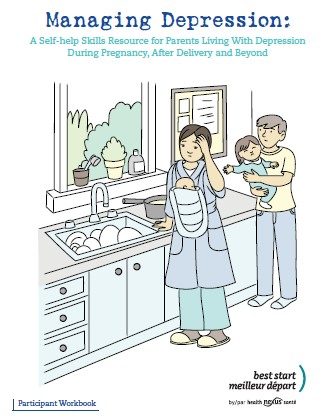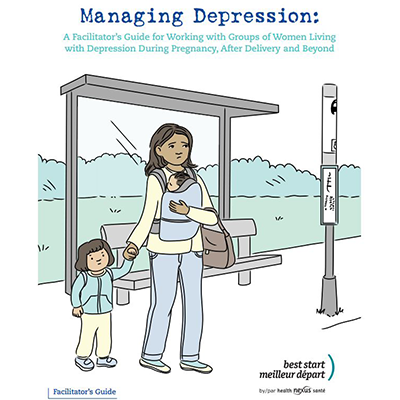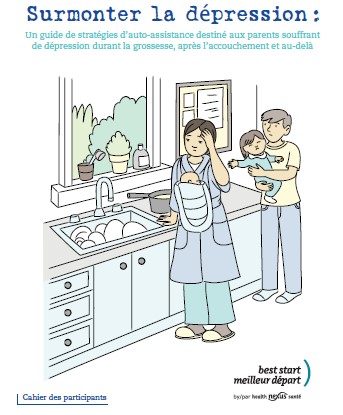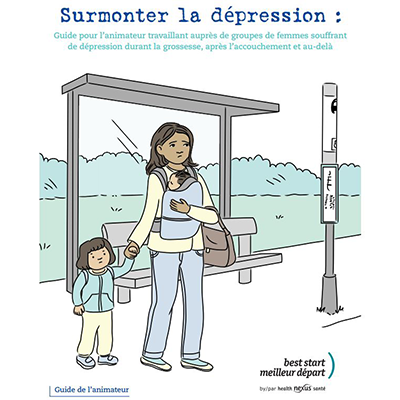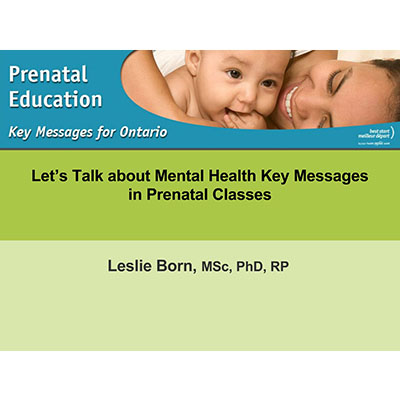The Managing Depression Facilitator’s Guide is a resource that was designed to assist facilitators working with women who are living with depression during pregnancy, after delivery and beyond. It provides suggestions on how to deliver five, 2 hour group sessions on depression using the resource: Managing Depression: A Self-help Skills Resource for Women Living With Depression During Pregnancy, After Delivery and Beyond.
This facilitator’s guide includes suggested activity plans, activities and support materials that will assist facilitators in guiding participants through the Managing Depression Group. The focus of each of the five sessions is:
- Session 1 – Understanding what depression is, what causes it and how to get help
- Session 2 – Exploring how to reactivate your life
- Session 3 – Exploring how to think realistically
- Session 4 – Exploring how to solve problems effectively
- Session 5 – Exploring how to reduce the risk of relapse
Also available in French.
The Managing Depression Facilitator’s Guide is a resource that was designed to assist facilitators working with women who are living with depression during pregnancy, after delivery and beyond. It provides suggestions on how to deliver five, 2 hour group sessions on depression using the resource: Managing Depression: A Self-help Skills Resource for Women Living With Depression During Pregnancy, After Delivery and Beyond.
This facilitator’s guide includes suggested activity plans, activities and support materials that will assist facilitators in guiding participants through the Managing Depression Group. The focus of each of the five sessions is:
- Session 1 – Understanding what depression is, what causes it and how to get help
- Session 2 – Exploring how to reactivate your life
- Session 3 – Exploring how to think realistically
- Session 4 – Exploring how to solve problems effectively
- Session 5 – Exploring how to reduce the risk of relapse
Also available in English.
The Prenatal Education Key Messages resource is a central source of evidence-based information that can be used for routine universal prenatal education by a range of prenatal education providers. This webinar focuses on using the Mental Health Key Messages in a prenatal class setting to promote the use of consistent, evidence-based messages. This webinar took place on March 2, 2017.
Objectives for this webinar included:
- To review current knowledge about Perinatal Mental Health.
- To review the Mental Health Prenatal Education Key Messages.
- To provide insight into how to introduce and teach about the various mental health key messages in a prenatal class setting, and how to best reach those who may need help the most.
Speaker: Leslie Born, MSc, PhD, RP
Leslie is a Registered Psychotherapist with the College of Registered Psychotherapists of Ontario. She is a part-time faculty member of the Department of Psychiatry and Neurosciences at McMaster University, and works as a Mental Health Counsellor for the Hamilton Family Health Team. Leslie has more than 15 years of clinical, research and teaching experience in perinatal mental health, and was an expert reviewer for the Mental Health Prenatal Education Key Messages. She has also contributed to several other Best Start projects including: Creating Circles of Support for Expectant and New Mothers, Supporting Parents When Parents Experience Mental Health Challenges, and the new Managing Depression Self-help Skills Resource for Women Living with Depression during Pregnancy, After Delivery and Beyond.
